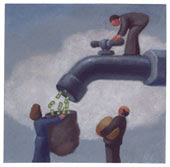 After Schwab had thrown down the gauntlet a few months ago by offering a small menu of commission free ETFs, it was only a matter of time before someone else picked it up. MarketWatch reports in “Big brokers cut commissions to draw ETF assets:”
After Schwab had thrown down the gauntlet a few months ago by offering a small menu of commission free ETFs, it was only a matter of time before someone else picked it up. MarketWatch reports in “Big brokers cut commissions to draw ETF assets:”
Online brokers are fighting hard for a greater share of the fast-growing exchange-traded fund business, and investors stand to benefit from lower costs.
Two of the nation’s largest brokerage platforms are allowing customers to buy and sell some exchange-traded funds for free in a bid to attract business. The move could compel rivals to follow suit, encouraging investors to buy and sell ETFs.
Last week, Fidelity Investments said clients can trade several outside-managed ETFs online without paying commissions.
The Boston-based investment giant also cut U.S. online stock-trading commissions by as much as 60% to a flat rate of $7.95 a trade.
…
Fidelity’s alliance with ETF heavyweight BlackRock Inc. could mark a major milestone for the business. Fidelity is allowing customers to trade 25 iShares ETFs from BlackRock for free.
…
Some analysts said Fidelity’s move could be a response to Charles Schwab Corp. launching its first proprietary ETFs in November with commission-free online trades for Schwab clients.
Schwab’s eight ETFs had slightly more than $570 million in assets under management as of Feb. 3, said spokesman David Weiskopf.
Fidelity launched its first and only ETF in 2003, the Fidelity Nasdaq Composite Index Tracking Stock. It had about $127 million in assets at the end of January, according to Fidelity.
“Our customers have been showing an increasing interest in ETFs,” said James Burton, president of Fidelity’s retail brokerage business, in an interview.
He declined to discuss the financial details of the deal with BlackRock other than to say it was a multiyear marketing agreement. Burton also declined to comment on whether Fidelity plans to grow its own ETF lineup beyond its single offering. “We study a wide array of product opportunities all the time,” he said.
While I am all in favor of low or now fees, I also want to sound a word of caution. Just because something is free in the investment world, does not mean it’s appropriate.
When following trends in the market place, your main concern should be the momentum figures as shown in my weekly StatSheet. The higher the ranking, the more volatile the fund/ETF! You should make your selections based on your risk tolerance along with upward trending momentum numbers.
To select an ETF that has moved below its own long-term trend line, is showing mostly negative returns in all columns, but has no commission, should not be a candidate if you want to be long in the market.
If you go through the appropriate selection process, and you find two ETFs with identical features, and one is commission free, then by all means go ahead and select that one.
Otherwise, you are putting the cart before the horse, which will lead to investment choices that are not in tune with trend tracking principles.

Comments 3
Ulli,
Do you have any insights and advise for people who are currently holding bonds such as MWHYX and PTTDX in their portfolio's ? While both of these funds have performed phenomenally over the past decade is now the time to consider dumping them?
In the past I have always been a big believer in having a bond component in my portfolio, and it has served me well.
With interest rates set to rise, and a "bond bubble" having formed should investors dump these bond funds from their portfolios?
Anon,
I'll comment on these funds in a separate blog post. Hopefully next Monday.
Ulli…
Personally, I am not convinced that there is a "bond bubble" forming. While I don't own either of those bond funds, I do own BND, and was recently stopped out of TIP for a small gain.
I am wondering if there isn't a new paradigm, after the recent bear. After other severe bear markets, there were entire GENERATIONS that wouldn't touch stocks again for the rest of their lives. I read many of the comments after the MSN articles, and as hard as I find it to believe, there are apparently LOTS of people who just sat on their holdings through the whole bear and lost 35, 45, 55% (some had some bonds). An entire generation of people who had to put their retirement plans on hold.
Combine that with Wall St. shenanigans, government spending, uncertainty, etc. and I think one would be foolish not to consider that the landscape may have fundamentally changed.
It's the older people, middle aged and up, that have the money and make the money to invest. And they are also the least likely to want to hold stocks. The country needs better paying, more secure jobs for younger people if the market is going to advance.